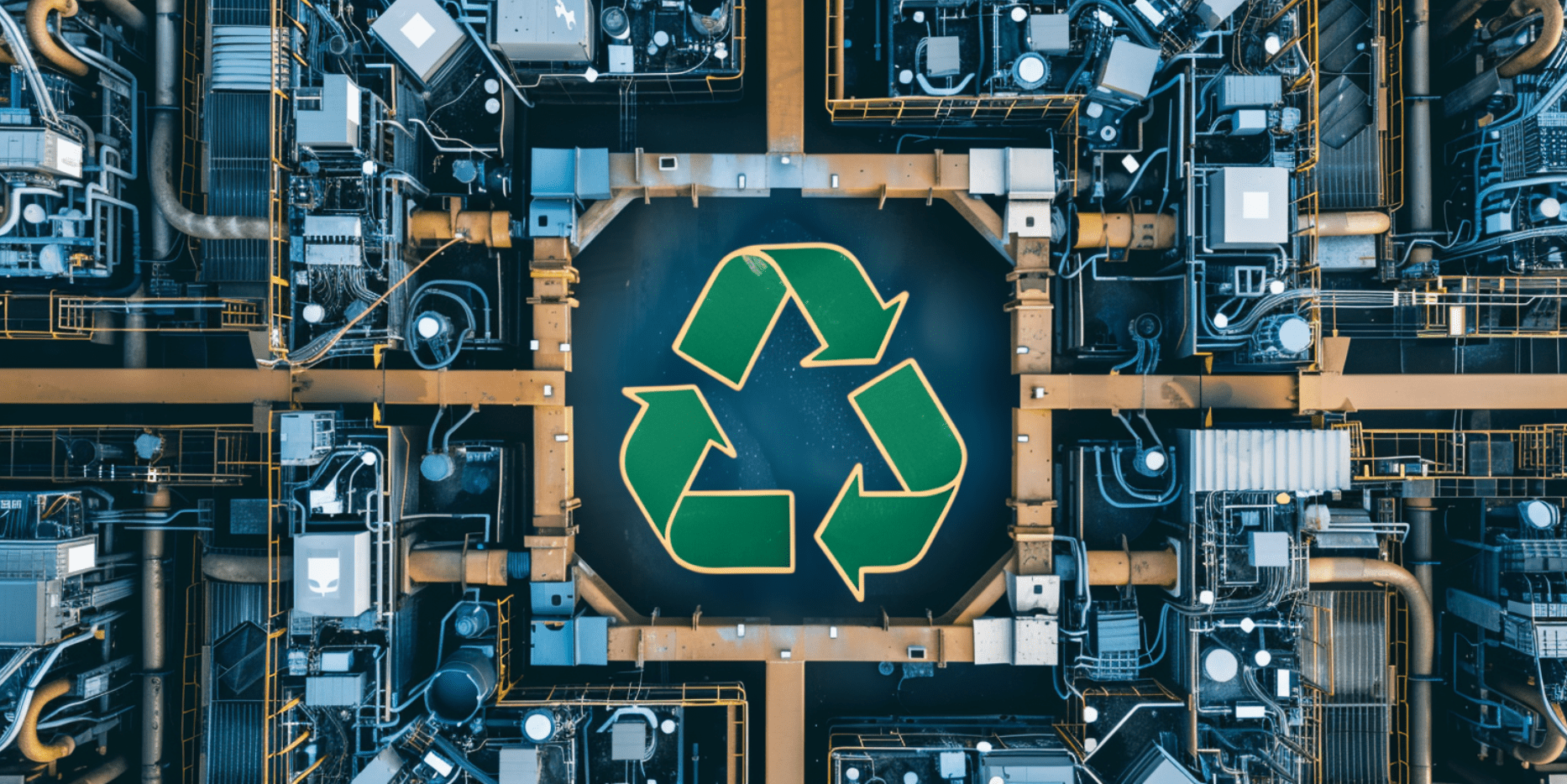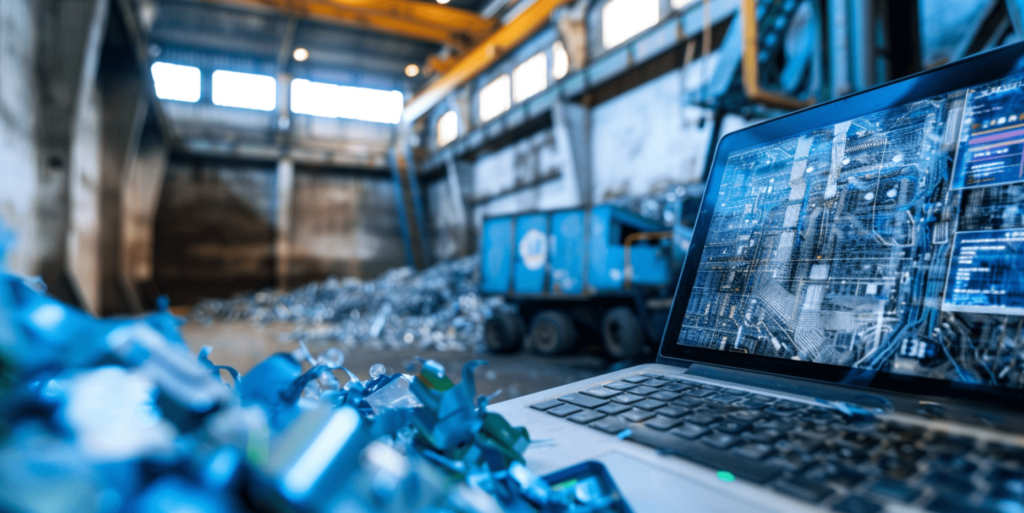
The tech world is changing fast, including how we manage waste. Artificial intelligence (AI) and machine learning are making significant changes to how we recycle, revolutionizing AI-powered waste management practices. As recycling plants start AI systems, they improve how we sort waste and lower the impact on our planet.
Overview of AI and Machine Learning
AI and machine learning look at a lot of data to find patterns and decide things. In waste management, AI can tell apart different types of waste accurately. This is important for recycling plants to work better and help the environment at the expense of recycling plants’ AI systems.
As AI in waste management improves, sorting waste becomes more accurate and faster, significantly impacting solid waste management. This means we can process more waste with less mess.
Importance in Recycling Industry
AI is transforming how we recycle by sorting waste better and making smart bins. These changes are leading to greener waste management systems. They help us use less and protect the environment.
More and more, AI is key to meeting zero-waste goals and making waste management smarter and cleaner.

Applications of AI in Recycling Equipment
AI is making a big difference in the world of recycling. It improves how plants sort materials, keep machines running and track everything. This new tech boosts recycling plants, making them work better, more precisely, and smarter, optimizing AI-powered waste management practices.
Automated Sorting Systems
Plants using AI see big improvements in their work speed. With AI, sorting waste becomes more efficient. Smart systems can now spot and separate different materials easily. This means there is less mix of materials, making the recycling process cleaner and more effective by reducing non-recyclable waste.
Predictive Maintenance
AI also helps by predicting when machines might fail. By looking at data, AI can see when maintenance is needed before a breakdown happens. This proactive maintenance saves time and money and keeps the machines running smoothly, reducing the overall environmental impact and the amount of waste.
Real-Time Monitoring
Furthermore, AI allows plants to monitor their machines in real-time, which means better control over what’s happening. Quick access to real-time data helps prevent issues and keeps the whole system running well. Smart bins are also used to sort waste at the beginning, making everything more efficient.
Benefits of Machine Learning in Recycling
Machine learning is revolutionizing how we recycle. It uses advanced math and computer smarts to improve recycling processes. This means we can manage waste in a way that’s good for the planet. Let’s look at the wins in recycling thanks to machine learning.
Increased Efficiency
Machine learning makes sorting waste quicker and improves how fast we can process it. This means trash gets handled more efficiently through AI-powered waste disposal systems. Machine learning also helps choose the best collection routes for collecting waste. This speeds things up, helps recycling plants work better, and cuts down on waste volume, improving waste management practices.
Enhanced Accuracy
Thanks to machine learning, recycling centers are getting much better at sorting trash and optimizing waste collection routes. Smarter algorithms can sort out the different kinds of solid waste, revolutionizing the waste management system. This cuts down on mistakes when sorting waste materials. All of this makes recycling more effective and less harmful to the planet.
Cost Reduction
Using machine learning in recycling saves a lot of money. Operations and efficiency improve, dropping costs. Recycling facilities can then save money, operate more sustainably, and manage waste more effectively. This tech step forward makes it cheaper to do recycling right, especially when dealing with plastic waste.
Case Studies and Examples
AI tech is changing waste management for the better. It’s showing big improvements in how we handle trash and recycling, particularly with plastic waste. For example, smart waste bins and AI waste sorters are making recycling processes faster, reducing mistakes, and improving how well they work.
Successful Implementations
Take Waste Management Inc., for instance. Their recycling plants have seen better accuracy and speed in sorting due to the integration of AI. Thanks to AI sorters, they can more accurately pick out recyclables. This reduces mixing and helps sustain recycling within the waste management system.
TOMRA Systems is another front-runner in integrating AI-powered waste management. They use AI to sort trash with advanced sensors and dynamic learning, transforming waste disposal practices. By making real-time changes in their sorting, they’ve raised the bar for recycling in municipal solid waste management using artificial intelligence. These stories show that AI can really change how we recycle.
Lessons Learned
When AI is used in waste management, we’ve learned a lot. One big lesson is that AI solutions need to be able to grow and change to meet different needs. Companies like Veolia found it tough to keep their AI up with a lot of work. Yet, AI’s ability to get better over time by learning from its tasks helps solve these problems in our waste management system.
Also, putting effort into making AI better is key. Suez, for example, points out we need to keep innovating AI for waste sorting. Learning from the start helps the waste industry use AI smarter, which allows them to better reach their environmental goals.
Challenges and Future Prospects
The future of waste management is linked closely to the rise of artificial intelligence. AI shows huge promise in dealing with plastic waste. Yet, it faces barriers that we must overcome to use it fully.
Technological Barriers
Getting AI into waste management takes a lot of work. It is expensive and complex, so many companies in waste management struggle to start using AI-powered systems.
AI is very smart but needs a lot of computer power and special knowledge. Small companies might need help managing this. However, the tech industry is working on making AI easier and cheaper to use in municipal solid waste management. This will revolutionize how we handle waste in a big way.
Future Developments
The future for AI in waste management is bright as it optimizes waste collection. New methods, like using AI to check waste chemicals, are coming. These new technologies will help us recycle better by finding materials more accurately and even identifying non-recyclable waste.
AI will also help revolutionize a circular economy. This means it will help use resources better and produce less waste. The future of waste management is heading towards these new ideas using AI-powered solutions. They will solve current issues in the waste management system and make the industry greener.
Conclusion
AI and waste management work together to make significant changes. Thanks to AI, recycling has become more efficient and saves money. With smart algorithms, waste collection routes are optimized, and recycling is done better, creating a more efficient waste management system. This revolutionizes waste management processes, making our world cleaner and less harmful to the environment. Sustainable waste management is key to these improvements.
Summary of Benefits
Using AI in waste management is a big win. It speeds up recycling and helps use resources better by reducing waste generation. Error-free waste sorting saves time and money, making recycling more efficient. It also helps cut costs in waste disposal and management. AI waste management is vital for the planet’s health and our future.
Future Outlook
With AI, the future of waste management looks bright. New AI tech will keep making recycling smarter and support green cities by revolutionizing waste management. For example, AI will help us better sort and recycle waste using advanced chemical analysis, making our lives cleaner and more eco-friendly.


